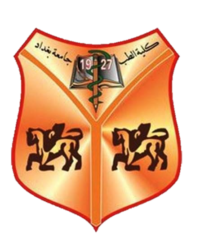Curriculum Description
This course description provides a necessary summary of the most important characteristics of the course and the expected learning outcomes for the student to achieve evidence of whether they made the most of the available learning opportunities. It must be linked to a description of the program.
General Description
- Name of Organization: Baghdad College of Medicine
- Department: Medicine Department / Psychiatry
- Module Name: Psychiatry
- Course Pattern: Clinical Sessions and Large Group Lectures
- Semester and Year: 5th Year
- Total Course Hours: 30 Theoretical Hours, 35 Clinical Sessions Hours
Goal of the Course
- Teaching students the basic principles of psychiatric medicine through theoretical lectures.
- Examining patients with various psychological and mental symptoms and arriving at a preliminary diagnosis with emphasis on the importance of mental illness and its relationship to internal medicine and neurological medicine, as well as educating students about fighting the social stigma associated with mental illness in order to play an educational role in society.
- Reviewing comprehensive medical ethics for the five stages.
Outcome of this Module
A. Cognitive and Theoretical Goals:
- Definition of mental illnesses.
- Definition of the causes and mechanisms of psychiatric diseases.
- Knowledge of diagnosing psychiatric diseases.
- Knowledge of the treatment of psychiatric diseases.
- Knowing the future and development of psychiatry and its complications.
B. Skills:
- How to take psychiatric history.
- How to do psychiatric (Mental state) exam.
- Educating psychiatry diagnostic methods.
Methods of Learning
- Using the curriculum plan (large groups and clinical sessions).
- Using references.
- E-learning.
- Using images and video explanations.
Methods of Assessment
- Clinical history and exam.
- Practical exam using images and videos.
- Using a checklist through a clinical exam.
Values and Sentimental Goals
- Learning medical ethics.
- Encouraging students to have the feeling of responsibility for the patients.
General and Qualifying Skills
- Encouraging the students to self-learn and apply what they have learnt with the patients.
- Enhancing self-confidence in the students.
Infrastructure
| Topic | Outcomes | Method of Assessment | Teaching Method | Hours | Weeks |
|---|---|---|---|---|---|
| Introduction to Psychiatry | Mentioned | Written Exams | Large Group Lectures | 70 | 1-27 |
References
- Course Books Required: Davidsons principles and practice of medicine, Psychiatry for students
- Main References (Sources): Introduction to psychiatry
Recommended Resources
- Psychiatry journals
Electronic References
Course Development Plan
- Addition of more clinical exams.
- Addition of more illustrations (videos and images).
- Addition of the updates in the diagnosis and treatments in psychiatry to the curriculum.

